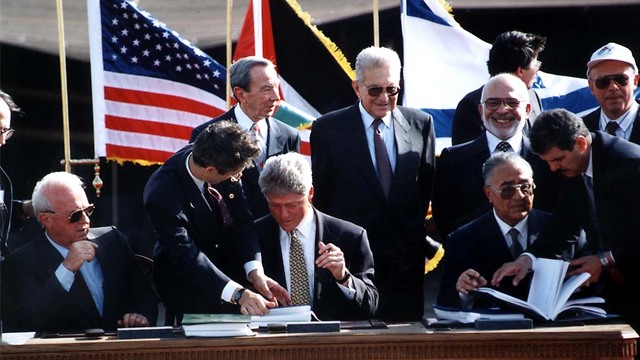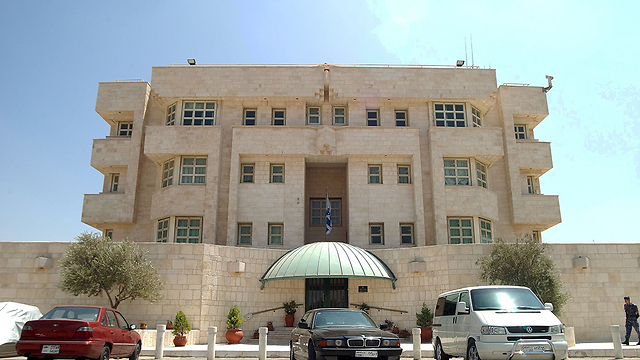
Fruit of Israeli-Jordanian peace still on the tree
Op-ed: The Israel-Jordan peace agreement is a strategic asset with huge potential for both countries in many aspects. The reopening of the Israeli embassy in Amman, after ending a six-month diplomatic crisis, is an opportunity to realize at least part of this potential.
This won’t make newspaper headlines. The Israeli-Jordanian peace agreement is barely addressed in Israeli public discourse. Many Israelis are unaware of its advantages and importance.
On the Jordanian street, the attitude towards the peace agreement with Israel is even worse. It’s an attitude of hostility and objection to any form of a relationship with Israel. But these are peace relations which have a huge potential, and only a little of it has been realized.
The peace agreement is based on its strategic importance to both sides. From the Jordanian perspective, the peace agreement with Israel is a highly important strategic anchor of stability: It has reinforced the Israeli umbrella of defense, as well as Jordan’s strategic relations with the United States. The Israeli-American umbrella of defense is crucial for Jordan in light of external threats from the east and from the north, but it also helps with internal security against the subversion of regional and local terror elements.
From the Israeli perspective, the peace agreement with Jordan is one of the pillars of the strategic-political stability, alongside the peace agreement with Egypt. Jordan serves as a friendly buffer state and a strategic partner—in the past, against threats from an Iraqi-led Arab front, and in recent years, against an Iranian-led Shiite coalition and dangers from the direction of Syria.
The extensive security cooperation became possible after the two governments recognized the critical need for this type of cooperation and invested all the required efforts, resources and attention for its development. The other areas—diplomatic, economic and civilian—haven’t enjoyed the same amount of attention and haven’t been perceived as equally vital, and the Israeli-Palestinian conflict has made it very difficult to advance collaborations in these areas. As a result, the great potential hidden in the peace agreement hasn’t been realized.
In the diplomatic area, Jordan could become a closer partner of Israel in managing the relations with the Palestinians and furthering peace processes. It could be, as it has proved in the past, a good partner in running Jerusalem’s holy sites. In addition, it could serve as a partner in advancing relations with other Arab countries.
In the civilian area, Israel and Jordan share a number of issues and joint challenges that require tighter cooperation. Water is of course a key issue, and the existing agreements—coupled with the Red Sea–Dead Sea Conveyance and water swaps plans—point to the existing potential. Furthermore, collaborations between the countries on issues and projects in the fields of environment, energy, tourism and infrastructure will provide the two countries with dividends that each country would be unable to achieve on its own.
It’s true that without considerable progress towards an Israeli-Palestinian agreement, the huge potential concealed in the relations between the countries cannot be fully realized. Nevertheless, in light of the existence of a formal peace agreement, real and invaluable progress can also be achieved in the current state of affairs between Israel and the Palestinians.
The existing set of agreements between Israel and Jordan—in commerce, transportation, water, gas and other areas—serves as an infrastructure facilitating the quick advancement of plenty of collaborations, if the necessary priority is given.
The economic aspect is a good example. From the Israeli perspective, the economic relations with the small Jordanian economy are of minor importance (even in light of the latest agreement to sell natural gas to Jordan), but Jordan has a very important role as a bridge for Israeli commerce with the large Gulf state markets and other Arab markets.
According to studies conducted in recent years, opening up the Arab markets to Israel will create a new and powerful growth engine that would help increase the Israeli product by a quarter or a third more than expected in today’s conditions, and will make Israel part of the group of the world’s 15 richest countries. The Arab market will become Israel’s most important market alongside the European market.
The existing commerce and transportation agreements between Israel and Jordan could serve as a basis for the development of a new route of commerce between the Gulf states’ large markets and the Mediterranean Sea, through Jordan and Israel. This route is already active today, through the Jordan River border crossing near Beit Shean and the Haifa Port, but the volume of freight passing through it is relatively small. Turning this route into a regional terrestrial bridge will become possible by connecting Israel Railways to the new regional railway network.
This network is already in advanced construction stages in Saudi Arabia and along the Persian Gulf coasts. The plan is for Jordan to serve as the main junction of this network. Connecting the Jordanian train to Israel’s valley railroad will make it possible to complete the terrestrial bridge.
Despite some major difficulties, this project is politically feasible, as it is based on an active route and on a system of existing trade and transportation agreements. Any progress in this project could help create a new climate of faith in Israeli-Jordanian peace and gradually change the Jordanian (and Israeli) public’s views.
To strengthen the positive influence of the economic cooperation, it’s important to couple these moves with ongoing PR efforts among both the Israeli and Jordanian publics, which would stress the benefits of the peace process, change the perception towards the other side and support the establishment of warm peace. The public perception changes, for their part, would help strengthen the collaborations and create other benefits. “Success stories” in the Israeli-Jordanian contexts would help strengthen the two countries’ regional standing as players with a stabilizing—economic and diplomatic—contribution to the regional system in general.
The Israel-Jordan peace agreement is a strategic asset with huge potential for both Israel and Jordan in many aspects. The reopening of the Israeli embassy in Jordan, after it was closed for half a year following the crisis between the countries, is an opportunity to look into ways to fix the missed opportunity and realize at least part of the major potential concealed in the peace agreement.
Yitzhak Gal is a financial and business advisor specializing in the Arab markets, and a researcher at Tel Aviv University’s Moshe Dayan Center for Middle Eastern and African Studies and at Mitvim—the Israeli Institute for Regional Foreign Policies.
This article is based on a study of Israel-Jordan relations written as part of a Mitvim Institute project, “Israel’s relations with Arab states: The unrealized potential,” which can be read here (in Hebrew).













